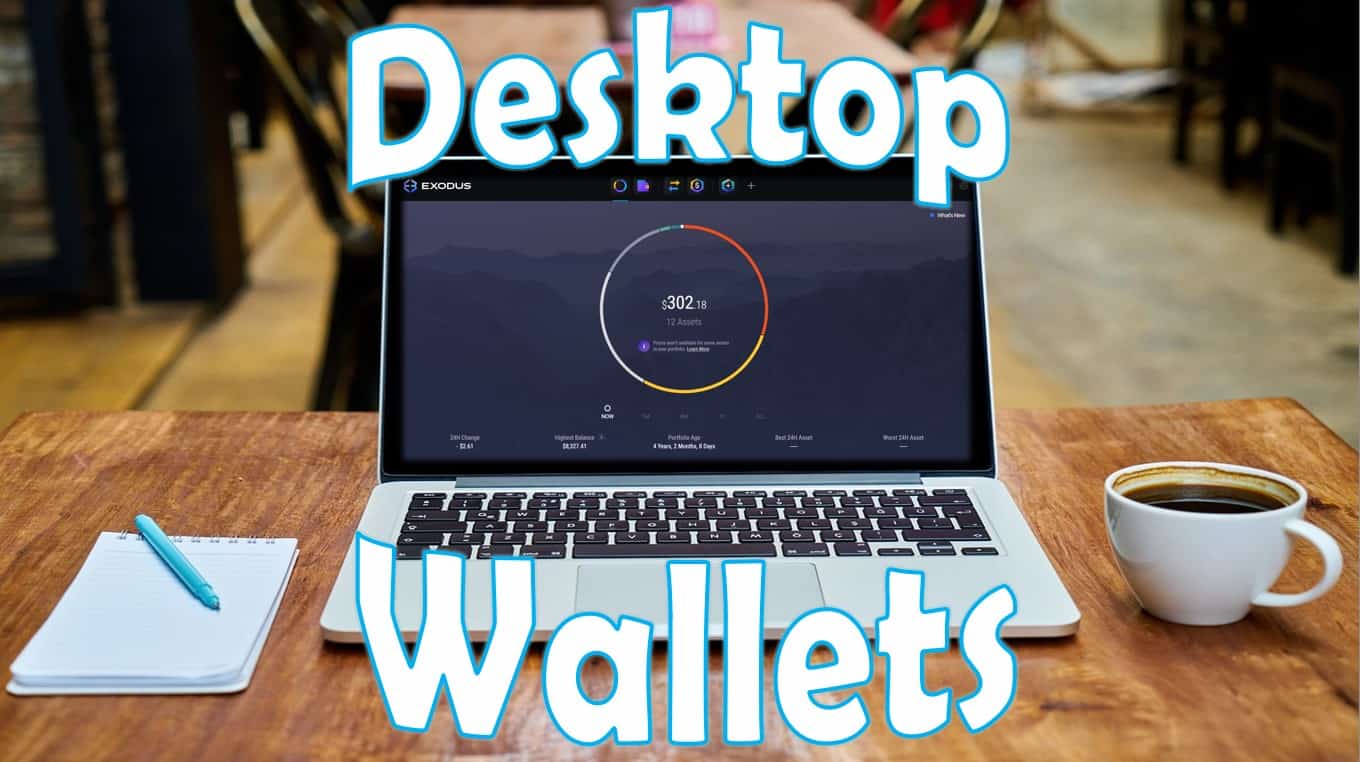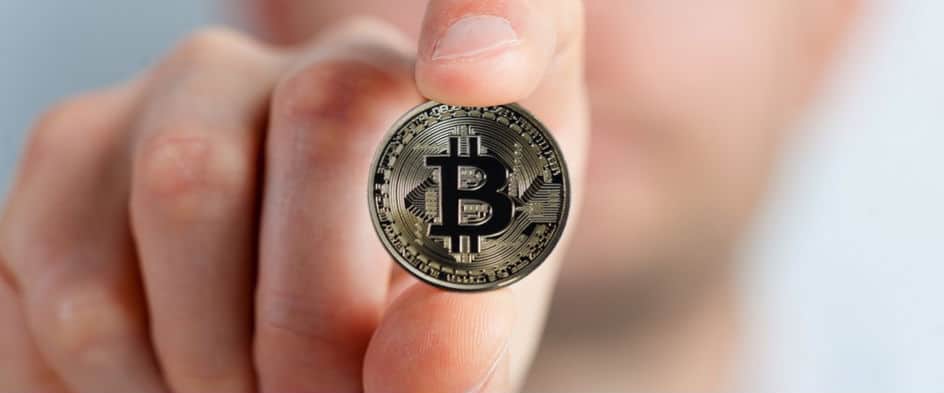
Desktop Wallets: The Pros & Cons Revealed
Last updated on August 20th, 2024 at 05:26 pm
One thing is for certain… holding cryptocurrency is like holding digital treasure!
And, if you have treasure, you definitely need to be able to secure it.
With crypto, it’s all about being able to keep these intangible, completely digital assets safe.
This means using a cryptocurrency wallet.
While there are many different types of crypto wallets available, this article is going to focus on desktop wallets.
A desktop cryptocurrency wallet is a software program installed on a personal computer or laptop, designed to store, send, and receive digital currencies. This type of wallet is considered a ‘hot wallet,’ and is usually noncustodial, giving a user complete control of their private keys. Desktop wallets can be broken into 2 types; lightweight and full node wallets. Lightweight wallets focus on speed and ease-of-use, while full node wallets store a complete copy of a blockchain.
As we continue on, we’re going to dive deeper into the lightweight and full node options.
But more than that, we’re going to discuss the benefits, and drawbacks of desktop wallets, and frankly, we’re going to look at exactly how they stack up against other crypto wallet options.
But moreover, I’ll offer my experience, and expertise, with various desktop wallets on the market. I will outline exactly what makes them tick, how to choose the best one for your needs, and why this type of wallet has changed the face of the crypto world.
No matter where your crypto journey leads you, the time is now to unlock the full potential of your digital assets.
So whether you want to invest and HODL, or trade your digital assets, let’s figure out if using a desktop wallet is right for you.
Divergence of Desktop Wallets
What & Why of Desktop Wallets
I think we can start out with an assumption… that assumption is…
The likelihood is high that everyone reading this article has access to a desktop or laptop computer.
If I’m wrong… then, my apologies…
But moving forward, I’m going to assume that this is true…
Furthermore, I’m also going to assume that those who have been around crypto for several years, probably, at one point, used this type of device to gain access to their desired crypto assets…
Again, if I’m wrong… then my apologies…
Frankly, I’M ALWAYS RIGHT SOME OF THE TIME 😆
Anyway… ultimately, as the cryptocurrency ecosystem has evolved, and continues to evolve, so too have the methods of accessing, buying, and trading cryptocurrencies.
So it stands to reason, that so too have the methods of storing these digital assets.
Evolution of Desktop Wallets
Desktop wallets, though having been around since almost the beginning of crypto, have played a significant role in the evolution of the crypto space as a whole. They have accomplished this by providing users with a secure, and customizable way to manage their crypto holdings.
As mentioned earlier, desktop wallets refer to software programs that allow users to store, send, and receive cryptocurrencies directly on their personal computers or laptops.
These wallets enable users to interact with blockchain networks, giving them full control over their Private Keys, and transactions.
Understanding what Private Keys are is an important part of your crypto journey… so much so that I’ve created these separate articles to help explain them.
Because these wallets have been around since nearly the birth of cryptocurrency, let’s take a more in-depth look at their history.

Present & Future of Desktop Wallets
As I mentioned earlier, desktop wallets have been around since the early days of cryptocurrency.
One of the first desktop wallets was Bitcoin Core. It was initially released in 2009 as a full node implementation of the Bitcoin protocol.
This pioneering wallet allowed users to store and manage Bitcoin directly on their computers, while also contributing to the decentralization of the network.
Over time, other cryptocurrency projects adopted similar desktop wallet solutions, offering users greater flexibility and control over their digital assets.
Today, there are numerous desktop wallets available for various cryptocurrencies. Most of these are considered Lightweight Wallets.
Some of these lighter weight options include simple wallets like Electrum, to more comprehensive, and more user friendly solutions like Exodus.
However, even today, there is a need for desktop wallets similar to Bitcoin Core.
These are referred to as Full Node Wallets because they house a complete copy of a particular blockchain.
But you might be asking yourself, what is a Node as it relates to cryptocurrency?
A very good question… you can read more about that here.

Outside of Bitcoin, a good example of this type of wallet would be the Daedalus Wallet for Cardano.
If you want to see the evolution in the development of the Daedalus Wallet, you can check out my Cardano and Daedalus playlist here.
Full Node Wallets service a particular blockchain, but stores all the crypto assets available on said chain. As such, it requires an extreme amount of computational power, and of course, storage space.
Ultimately, as of the writing of this article, desktop wallets remain an integral part of the crypto ecosystem.
They do so by providing users with noncustodial benefits, and a higher level of security than is available on most hot wallets.
Want to know more about noncustodial wallets?
You should… learn more here.
How about hot wallets?
You should… learn more here.
It’s clear that desktop wallets are, and will continue to be an essential tool for users seeking security, customization, and control over their digital assets.
Now it’s time to take a look at the benefits and drawbacks to this type of wallet.
Pros & Cons of Desktop Wallets
| Advantages | Disadvantages |
|---|---|
| Higher Security Hot Wallet | Requires Proper Backup For Wallet Recovery |
| Complete Private Key Control | Only As Secure As Device Used |
| Newbie Friendly | May Require Large Computational Resources |
| Convenient Access to Crypto Assets | Requires Periodic Software Updates |
| Most Support Multiple Cryptos | Susceptible to Hacks |
| Some Provide Hardware Wallet Integration | Vulnerable to System Failures |
| Some Provide Multi-Signature Integration | Need Your Computer To Access Your Wallet |
| Little or No Cost |
When you are looking at different types of cryptocurrency wallets, one of the most important preferences for users is convenience.
If this is a primary concern for you, then perhaps a desktop wallet is the way to go… at least for the active portion of your crypto holdings…
As I’ve mentioned in previous articles, life comes with trade-offs. You have to match your needs, and your risk tolerance, to the wallet that is ultimately best for you.
Desktop wallets come with their own unique set of advantages and drawbacks. Let’s take a look at some of those now.
Desktop Wallet Benefits
While convenience is certainly important, it isn’t going to be worth a lot if you can’t set up your wallet.
Frankly, I would argue that the best part about desktop wallets is the fact that, for the most part, they are extremely user friendly… especially for the newbie or non-techie.
But, maybe I’m just a tech-a-phobe… 🤣
OK… back to convenience…
As I mentioned earlier, one of the primary benefits of desktop wallets is the convenience that comes from the ease of access to your digital assets. They give the average crypto user, or trader near immediate access to their funds.
And, unlike other hot wallets, desktop wallets provide enhanced security.
Since desktop wallets are stored locally on a user’s computer, they are less susceptible to hacking attempts, such as those that target centralized exchanges, or web-based wallets with continual internet access.
But the benefit of convenience doesn’t end there…
Additionally, many desktop wallets support a wide range of cryptocurrencies.
This means that one wallet may be all you need to manage your entire digital asset portfolio.
Not that I suggest HODLing all your crypto this way… as the old saying goes, ‘don’t put all your eggs in one basket’
While some would say that this next point is not about convenience, I would argue that if it’s not, it should be…
Desktop wallets also provide users with full control over their Private Keys.
Frankly, the peace of mind that comes with knowing you can restore your wallet, and regain access to your digital assets with your Private Keys can not be overstated.
Frankly, this one benefit alone is crucial for anyone investing in crypto.
Moreover, desktop wallets often come with advanced functionalities, such as integration with hardware wallets.
This feature allows for an additional layer of security, ensuring your crypto assets are safe because they are protected by a hardware wallet.
For those who want to help provide decentralization and security to your favorite blockchain, some desktop wallets give you the ability to participate in staking, or running full nodes.
This ability to run a full node, for instance, allows users to contribute to the network’s decentralization, and verify transactions independently, thus enhancing the robustness and integrity of the blockchain network.
However, desktop wallets are not without their risks and downsides. So let’s take a look at some of the disadvantages to desktop wallets.
Desktop Wallet Drawbacks
As great as it may be, that a desktop wallet provides users a better level of security than other hot wallet options, like online and mobile wallets… they are NOT IMMUNE to online threats!
To start, a desktop wallet is heavily dependent on the security of the user’s computer.
So, if the computer you’re using is infected with malware, keyloggers, or other types of malicious software, your crypto wallet can be compromised.
But wait… the potential threats don’t end there…
Remember, your desktop wallet is located… well… on your desktop or laptop computer…
These are electronic devices… so unfortunately, they fail from time to time…

Not to mention, they always require software and O/S updates to ensure they continue working properly… and sometimes these updates can be incompatible with your wallet.
And let’s not forget, we are clumsy (well, at least I am), so these devices can get damaged, or even destroyed.
The bottom line is, each of these issues are an area of potential loss of your crypto.
Let’s face it, all of these threats, and more, are very real.
You are the initial line of defense.
To help you prepare, I’ve created some resources.
No matter what desktop wallet you’re using, you need a backup. This article will help you with that.
Next, understanding what, if any options you have if your wallet is lost or compromised is critical.
Honestly, if you didn’t complete a proper back up your wallet, your recovery options are EXTREMELY LIMITED.
This article spells out if your crypto assets can be recovered.
Finally, this article will layout the most extreme recovery possibilities.
Weighing Your Wallet Options
So how do you decide if using a desktop wallet is the best option for you?
Ultimately, you must carefully consider your specific needs and priorities.
At the end of the day, desktop wallets are a convenient, and cost-effective option for storing your private keys, ultimately providing you with complete control of your assets.
While they are certainly newbie and user-friendly, they come with a number of device related risks.
Basically, your wallet choice should be a reflection of your specific needs, and risk tolerance.
In order to best make this decision, it might be helpful to compare desktop wallets to your other noncustodial options.
Desktop Wallet vs Other Options
The comparisons that we are about to discuss will point out the key differences between a desktop wallet and your other choices.
All of these comparisons will be for noncustodial wallets, and will consider the following criteria; cost, convenience, and security.
Desktop Wallet vs Paper Wallet
Let’s begin our comparisons with an analysis of desktop vs paper wallets. We will discuss the comparison points of cost, convenience, and security features to help you make an informed decision.
| Areas of Comparison | Desktop Wallet | Paper Wallet |
|---|---|---|
| Cost | X | X |
| Convenience | X | |
| Security | X* |
*Set Up Correctly
Cost: This is an area where both of these wallet options shine. Many of the best desktop wallets are generally free to download and use. While some desktop wallets may charge fees for specific features or premium services, their basic features are free to use.
One of the biggest advantages of paper wallets is that they are inexpensive to create. All you need is a computer, printer and a piece of paper to print your public and private keys. These days, each of these items are readily available.
Convenience: Desktop wallets are more user-friendly than paper wallets, and they better strike a balance between security and convenience. Most desktop wallets have intuitive interfaces, allowing you to easily send and receive funds by simply clicking a few buttons. This makes them suitable for both beginners and experienced users.
While creating a paper wallet is simple, using it can be less convenient. To start, they are not suitable for frequent transactions. This is because to access your funds, you often need to import your private key into a software wallet, which can be a somewhat complex process. And, if you don’t have a ‘change address’ set up, when you spend your crypto in your paper wallet, anything ‘left over’ will be lost.
Security: While desktop wallets provide a heightened level of security as it relates to hot wallets, it does not provide the same level of security as a paper wallet. As with any wallet stored online or on another device, it is only as secure as the device it resides on. Remember, your private keys are stored on the device. While many desktop wallets offer users additional security features, they ultimately remain susceptible to online attack vectors.
Paper wallets offer a high level of security, as they are completely offline, otherwise referred to as cold storage. Once set up, this makes them immune to online threats such as hacking or phishing.
And that is the rub, in order to enjoy this highest level of security, measures must be taken during setup to ensure it. Finally, these wallets are obviously not impervious, they are vulnerable to physical risks like damage, loss, or theft.
Desktop vs Paper Takeaway
Choosing between a desktop wallet and a paper wallet depends on your unique needs and circumstances.
If you need to access your funds regularly, and value convenience and additional features, a desktop wallet might be the best choice.
However, if you value high security, and plan to store your crypto for a long time without accessing it frequently, a paper wallet would be more suitable.
For those who decide that a desktop wallet should be part of your crypto strategy, I use, and recommend, Exodus.
As always, no matter which type of wallet you choose, never forget that keeping your private keys safe is of paramount importance.
In the end, it’s possible to use both wallet types.
Afterall, there will likely be crypto assets you wish to HODL long term, and others you want to trade, or use more frequently.
Desktop Wallet vs Hardware Wallet
While paper wallets are certainly considered a cold wallet option, they are not the only type available. As a matter of fact, hardware wallets are considered superior when it comes to the cold storage of cryptocurrency, even though they too come with their own set of drawbacks.
As we did previously, we will look at these wallet options and compare them in terms of cost, convenience, and security.
| Areas of Comparison | Desktop Wallet | Hardware Wallet |
|---|---|---|
| Cost | X | |
| Convenience | X | |
| Security | X |
Cost: Desktop wallets are budget-friendly as most are available for little or no cost. Given most of us already have a desktop or laptop at our disposal, it makes a desktop wallet one of the most economical options for storing your crypto.
In contrast to desktop wallets, hardware wallets come with an upfront cost. Once you choose which physical device is best for you, then the purchase must be made. Prices for hardware wallets vary depending on the brand and model, but they generally range from $50 to $250 USD. While this may seem like an expense, it should be looked at as an investment in top-tier security.
Convenience: This is where a desktop wallet shines. These wallets provide access to your digital assets, quite literally, at your fingertips.
However, if convenience is strictly related to asset access, the hardware wallet certainly does not fit the bill. Frankly, this is by design, it’s supposed to be difficult to access funds that you won’t need for a long period of time. But, if convenience relates to user friendliness of your wallet, then some hardware wallets might not be so bad. Though it is definitely dependent on device design, many have a user-friendly interface.
Security: As I mentioned before, desktop wallets provide a higher level of security as it relates to other hot wallet options. However, they are nowhere near the level of security that can be achieved by a properly backed up and secured hardware wallet. Furthermore, they are susceptible to most online attack vectors.
Hardware wallets excel here as they offer a high level of security for the average, and even the advanced, crypto user. They store your private keys on a secure physical device, keeping them isolated from potential online threats.
Desktop vs Hardware Takeaway
As I mentioned in our previous comparison, the choice between a desktop wallet and a hardware wallet ultimately depends on your specific needs and circumstances.
If you are going to need to utilize your assets on a frequent basis, or if you plan to HODL a limited amount of crypto, a desktop wallet is likely your best option.
However, If you value high security, and you plan to HODL long-term, does it not make sense to utilize the most secure option?
Remember, regardless of which type of wallet you choose, the safety of your private keys is paramount.
So, if you decide on using the hardware wallet option, I use and recommend Tangem Wallet. It is the easiest to set up, and use, hardware wallet.
As before, remember you can use both wallet types simultaneously. Frankly, utilizing more than one wallet is a recommended action when transacting with crypto.
Desktop Wallet vs Mobile Wallet
These two wallets are actually pretty similar. Both are considered hot wallets, both are housed on devices, and both are susceptible to online attack vectors.
As before we will discuss the same criteria as we break this comparison down.
| Areas of Comparison | Desktop Wallet | Mobile Wallet |
|---|---|---|
| Cost | X | X |
| Convenience | X | |
| Security | X |
Cost: As we’ve discussed previously, desktop wallets are incredibly cost-effective due to their little to no cost for users.
Just like desktop wallets, there are several, good, noncustodial mobile wallets available to users that are free to download and use. By choosing one of these options, the cost rivals that of a paper wallet.
Convenience: As discussed earlier, desktop wallets provide users with easy access to their assets. The limitation is that you need to have your desktop or laptop with you.
In terms of convenience, mobile wallets are superior, mostly because just about every person on the planet has a cell phone with them all the time. Their convenience continues with their friendly UI’s, so they are perfect for beginners and experienced users. But more than that, these wallets also offer a wide range of support crypto assets.
Security: As I’ve previously mentioned, desktop wallets offer users a higher level of security in comparison to other hot wallet options. However, your private keys are only as secure as the computer that your wallet is located on.
While mobile wallets provide a reasonable level of security, they are ‘hot wallets’, meaning they are connected to the internet and thus potentially vulnerable to online attacks. As with a desktop wallet, keep in mind that your mobile wallet is only as secure as the device it is operating on.
Desktop vs Mobile Takeaway
If you’ve read the other takeaways, you already know that the final choice here completely depends on your unique circumstances.
Again, a desktop wallet might be better suited for crypto assets you want to use on a more frequent basis.
However, a mobile wallet is more suited for regular trading, and more frequent transactions due to its accessibility, and user-friendly interface.
Also, as each takeaway section has highlighted, the safety of your private keys, no matter the wallet type, is paramount.
As always, the best recommendation is likely to use both wallet types simultaneously to give you the greatest amount of security and flexibility.
Desktop Wallet vs Online Wallet
As we wrap up our wallet comparisons, this final section will discuss a desktop wallet vs a very popular, and widely used wallet option; online wallets.
As before, the comparison will be in the areas of cost, convenience, and security.
| Areas of Comparison | Desktop Wallet | Online Wallet |
|---|---|---|
| Cost | X | X |
| Convenience | X | |
| Security | X |
Cost: As we’ve discussed throughout these comparisons, it’s hard to beat the cost effectiveness of desktop wallets.
Online wallets are often free to use, with many providers offering basic wallet services without charge. However, some may include fees for specific features or premium services.
Convenience: As we’ve seen in each previous comparison, desktop wallets are a user-friendly option.
However, online wallets provide an even higher level of convenience than desktop wallets. They are designed for easy access to your cryptocurrency holdings, and are suitable for frequent transactions. With user-friendly interfaces, they cater to both beginners and experienced users.
Security: Again, desktop and online (web) wallets are both hot wallets. But, desktop wallets have a higher level of security, because they are not continually connected to the internet.
While online wallets offer encryption and other security measures, they are vulnerable to online threats, such as hacking and phishing attacks. Not to mention, these web wallets are also connected to DeFi exchanges and other Web3 interfaces, providing additional attack vectors. Due to these vulnerabilities, they require strong security practices.
Desktop vs Online Takeaway
As we’ve discussed in each previous section, the choice of which wallet is best for your situation is a unique decision. With that, the same criteria apply.
If security, and smaller, longer term HODLing are your priorities, then a desktop wallet may be for you.
On the other hand, if you frequently transact with cryptocurrencies, or consistently accessing Defi or Web3 properties, and need easy access to your assets, then an online wallet would be more suitable.
Remember, that no solution is perfect, and using a combination is likely a best practice for the overall security of your crypto assets.
As you prepare to download a desktop wallet, it’s important to remember that there’s no one-size-fits-all solution.
Your choice of desktop wallet should be a reflection of your specific needs, and your digital abilities.
So let’s talk about the things you should be considering before you download a desktop wallet to your computer.

Downloading a Desktop Wallet
We’ved discussed throughout this article that a desktop wallet is one of the best ways of accessing your crypto assets.
These days, downloading a desktop wallet to your computer is easy, and straight forward. As I’ve mentioned earlier, I use and recommend Exodus.
So, I’m not going to walk you through it because you can easily follow the prompts.
But I believe it’s important to walk through some things you should consider before you download a desktop wallet to your device.
Considerations Before You Begin
Proper setup of a desktop wallet is critical to ensuring the proper storage, and security of your digital assets.
With this in mind, before you download a desktop wallet, here are some significant considerations you must consider.
Online Security: Being as secure as possible with everything you do online is more important than I could ever express in this paragraph. So, I’m going to refer you to resources that I’ve created to help set you down the best path. If you don’t know where to begin, start here. Learn to protect your PC and use a VPN.
Your Computer: Ensure you’re using a secure, and trusted computer system. The computer you use for this process should be free from malware, viruses, and keyloggers. Using a freshly formatted, and dedicated computer, often referred to as an air-gapped computer, is the best practice.
Wallet Backup: Securing your seed phrase is critical. For maximum safety, be sure to store it in separate secure locations. If one is lost or damaged, you’ll have a backup. Read more about securing your seed phrase here.
Desktop Wallet Possibilities
Throughout this article, we’ve embarked on a journey through the realm of desktop wallets, unlocking their potential as a fortress of security. Ultimately, a desktop wallet serves as a secure means of storing your cryptocurrencies and having quick and easy access to your assets.
Remember to review the considerations I just listed above before you decide to download a wallet.
The effective use of a desktop wallet hinges on adopting and maintaining these best practices.
By following those tips, you not only ensure easy access to, and safety of your digital assets, but you will gain peace of mind.
Frequently Asked Questions (FAQ)
Q: What is a desktop wallet?
A: A desktop wallet is a software application that allows users to store, send, and receive cryptocurrencies on their personal computer.
Q: Are desktop wallets secure?
A: Desktop wallets can be secure if used with proper security protocols in place.
Q: Can I use a desktop wallet with multiple cryptocurrencies?
A: Many desktop wallets support multiple cryptocurrencies, allowing users to manage and store various digital assets in one place.
Q: Are desktop wallets suitable for beginners?
A: Yes, desktop wallets are generally user-friendly and accessible to newcomers. However, it is crucial to understand the basics of cryptocurrency storage and security before using any crypto wallet.
Disclaimer
The information provided here is for INFORMATIONAL & EDUCATIONAL PURPOSES ONLY!
View our complete disclaimer on our Disclaimer Page






